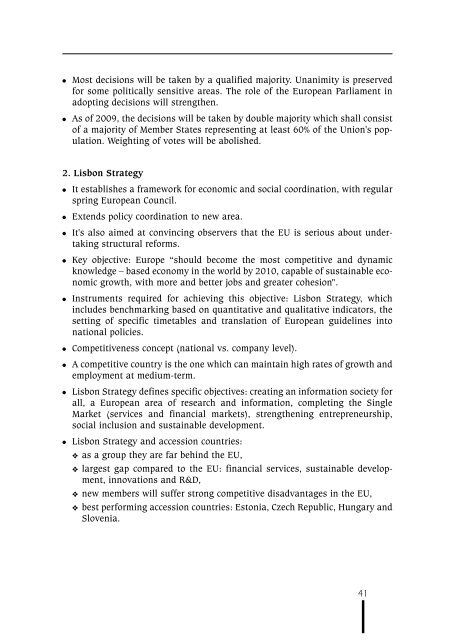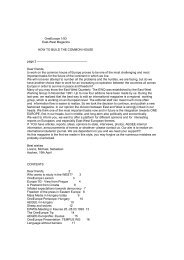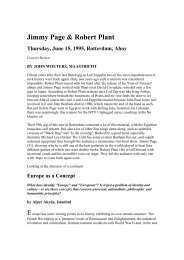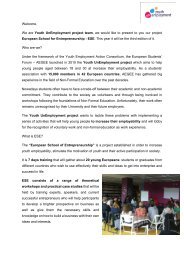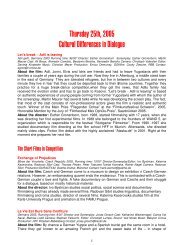europe's (torn?) identity - Projects - AEGEE Europe
europe's (torn?) identity - Projects - AEGEE Europe
europe's (torn?) identity - Projects - AEGEE Europe
You also want an ePaper? Increase the reach of your titles
YUMPU automatically turns print PDFs into web optimized ePapers that Google loves.
●<br />
●<br />
Most decisions will be taken by a qualified majority. Unanimity is preserved<br />
for some politically sensitive areas. The role of the <strong>Europe</strong>an Parliament in<br />
adopting decisions will strengthen.<br />
As of 2009, the decisions will be taken by double majority which shall consist<br />
of a majority of Member States representing at least 60% of the Union's population.<br />
Weighting of votes will be abolished.<br />
2. Lisbon Strategy<br />
●<br />
●<br />
●<br />
●<br />
●<br />
●<br />
●<br />
●<br />
●<br />
It establishes a framework for economic and social coordination, with regular<br />
spring <strong>Europe</strong>an Council.<br />
Extends policy coordination to new area.<br />
It's also aimed at convincing observers that the EU is serious about undertaking<br />
structural reforms.<br />
Key objective: <strong>Europe</strong> “should become the most competitive and dynamic<br />
knowledge – based economy in the world by 2010, capable of sustainable economic<br />
growth, with more and better jobs and greater cohesion”.<br />
Instruments required for achieving this objective: Lisbon Strategy, which<br />
includes benchmarking based on quantitative and qualitative indicators, the<br />
setting of specific timetables and translation of <strong>Europe</strong>an guidelines into<br />
national policies.<br />
Competitiveness concept (national vs. company level).<br />
A competitive country is the one which can maintain high rates of growth and<br />
employment at medium-term.<br />
Lisbon Strategy defines specific objectives: creating an information society for<br />
all, a <strong>Europe</strong>an area of research and information, completing the Single<br />
Market (services and financial markets), strengthening entrepreneurship,<br />
social inclusion and sustainable development.<br />
Lisbon Strategy and accession countries:<br />
❖ as a group they are far behind the EU,<br />
❖ largest gap compared to the EU: financial services, sustainable development,<br />
innovations and R&D,<br />
❖ new members will suffer strong competitive disadvantages in the EU,<br />
❖ best performing accession countries: Estonia, Czech Republic, Hungary and<br />
Slovenia.<br />
41


